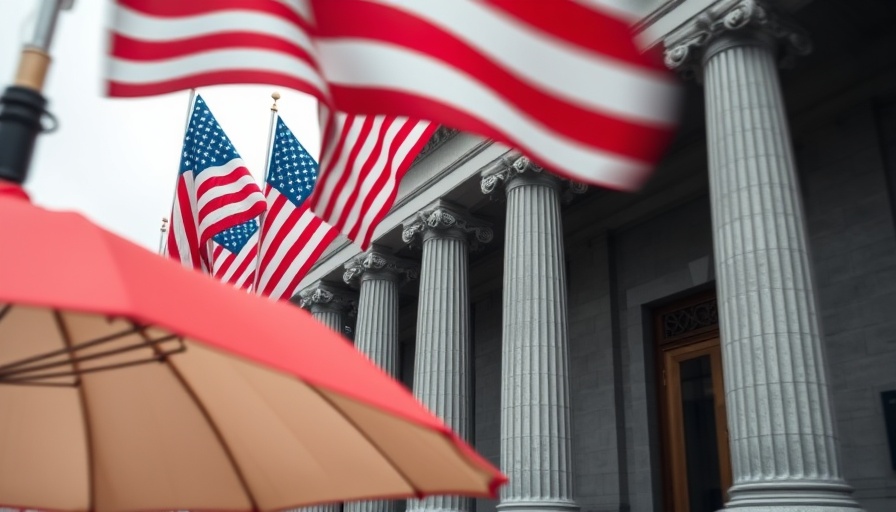
Trump's Tariff Strategy: A Gamble on the Global Stage
President Trump's recent tariff announcements have sent shockwaves through Wall Street, stirring not just financial markets but also deep-seated anxieties among investors and corporate leaders. As the S&P 500 plummeted almost 18% below its last peak, billionaire investors typically accustomed to a level of control and influence have found themselves lamenting the "stupidity" of the current economic strategy. The tariff chaos exposes not only vulnerabilities in the market but also the discord between political decisions and economic realities.
Billionaire Backlash: A Surprising Rebellion from Wall Street
For those who inhabit the gilded towers of Wall Street, power has traditionally been synonymous with influence over policy. This recent turn of events, however, has left even the biggest financial players feeling helpless. With their pleas for mercy falling on deaf ears, notable figures like Jamie Dimon of JPMorgan Chase arranged private meetings with key players in Trump’s administration, all to no avail. This unprecedented frustration harks back to the early pandemic days when economic leaders scrambled to guide the government's economic agenda.
Social Impact: When Tariffs Hit the Streets
The ramifications of tariffs extend far beyond Wall Street; they resonate in communities across the nation. Economists warn that consumer prices are likely to surge as tariffs choke supply chains, inevitably trickling down to everyday Americans. Not only does this jeopardize middle-class families who might see their purchasing power erode, but it may bubble over into international tensions. Historical patterns suggest that tariffs can lead to retaliatory measures, creating a ripple effect that could shatter both international relations and domestic stability.
Understanding the Math: The Risks and Costs of Tariffs
In his public outcry, hedge fund manager William A. Ackman identified a crucial issue: the flawed calculations underpinning the tariff decisions. Tariffs, while designed to protect domestic interests, often ignore complex global economic interdependencies that can make such strategies backfire. As Ackman stated, the current administration must acknowledge its missteps to avert broader economic damage. This commentary serves to highlight the potential pitfalls of ignoring the delicate balance of global trade.
Insights from History: Lessons Learned About Tariff Policies
Historically, tariffs have been a contentious tool in the broader toolkit of economic strategy. The Smoot-Hawley Tariff of 1930, which raised duties on over 20,000 imported goods, serves as a harrowing example of how protectionist measures can lead to economic downturns and global trade conflicts. Drawing parallels with current events, it seems history may be repeating itself, prompting questions about whether the administration is prepared to deal with similar quandaries.
Future Outlook: Will the Market Ever Recover?
As the market grapples with the turbulence caused by tariff announcements, investors face pressing questions about future stability. Analysts are divided on the prognosis; some suggest that a course correction by the administration could stabilize the markets, while others warn that the damage has already been done. The uncertainty leaves many wondering if they should brace for a recession or anticipate a rebound. Ultimately, much hangs on the administration's willingness to listen to the outcry from Wall Street.
The Emotional Toll: Stakeholder Reactions
The emotional and psychological toll of this upheaval cannot be overstated. As the accuracy and efficacy of tariff strategies come under scrutiny, confidence wanes among investors. Stakeholders feel more disconnected from decisions than ever, leading to a troubling sense of helplessness. The fear of financial loss permeates the boardrooms of corporate America, as executives find themselves at the mercy of political whims.
Hope for Change: Collective Voices and Economic Repair
Despite the bleak outlook, there is a glimmer of hope as corporate leaders band together, voicing their discontent in a united front. Through social media and direct lines to policymakers, their collective clamor signals a yearning for a return to reasoned economic governance. As these prominent figures make their case, the potential for meaningful dialogue about trade policy remains a possibility, though it requires a significant shift in approach from the Trump administration.
As the political landscape evolves, one must remain vigilant about how economic decisions will shape the future of American markets. The narrative unfolds, showcasing how the stakes are high—both for Wall Street and ordinary Americans—who could bear the brunt of tariff-induced turmoil.
 Add Row
Add Row 
 Add
Add 


Write A Comment